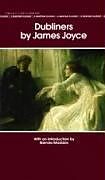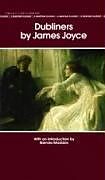Dubliners
Einband:
Kartonierter Einband
EAN:
9780553213805
Untertitel:
Englisch
Genre:
Märchen, Sagen & Legenden
Autor:
James Joyce
Herausgeber:
Random House Publishing Group
Anzahl Seiten:
224
Erscheinungsdatum:
01.03.1990
ISBN:
978-0-553-21380-5
Zusatztext In Dubliners ! Joyce's first attempt to register in language and fictive form the protean complexities of the 'reality of experience!' he learns the paradoxical lesson that only through the most rigorous economy! only by concentrating on the minutest of particulars! can he have any hope of engaging with the immensity of the world.from the Introduction Joyce renews our apprehension of reality! strengthens our sympathy with our fellow creatures! and leaves us in awe before the mystery of created things. Atlantic Monthly It is in the prose of Dubliners that we first hear the authentic rhythms of Joyce the poet Dubliners is! in a very real sense! the foundation of Joyce's art. In shaping its stories! he developed that mastery of naturalistic detail and symbolic design which is the hallmark of his mature fiction. Robert Scholes and A. Walton Litz! authors of Dubliners: Text and Criticism Informationen zum Autor James Joyce with an introduction by Brenda Maddox Klappentext James Joyce has been hailed as one of the great literary rebels of our time. He rebelled against social and literary conventions, against Catholicism, and against Dublin, the city at the center of this magnificent collection of stories. In Dubliners, Joyce paints vivid portraits of the denizens of the city of his birth, from the young boy encountering death in the fist story, "The Sisters, to the middle-aged Gabriel of the haunting final story, "The Dead. This collection is both unflinchingly realistic portrait of "dear dirty Dublin and, as Joyce himself explained, a window through which his countrymen could get "one good look at themselves. Leseprobe THE SISTERS There was no hope for him this time: it was the third stroke. Night after night I had passed the house (it was vacation time) and studied the lighted square of window: and night after night I had found it lighted in the same way, faintly and evenly. If he was dead, I thought, I would see the reflection of candles on the darkened blind for I knew that two candles must be set at the head of a corpse. He had often said to me: "I am not long for this world," and I had thought his words idle. Now I knew they were true. Every night as I gazed up at the window I said softly to myself the word paralysis . It had always sounded strangely in my ears, like the word gnomon in the Euclid and the word simony in the Catechism. But now it sounded to me like the name of some maleficent and sinful being. It filled me with fear, and yet I longed to be nearer to it and to look upon its deadly work. Old Cotter was sitting at the fire, smoking, when I came downstairs to supper. While my aunt was ladling out my stirabout he said, as if returning to some former remark of his: "No, I wouldn't say he was exactly . . . but there was something queer . . . there was something uncanny about him. I'll tell you my opinion. . . ." He began to puff at his pipe, no doubt arranging his opinion in his mind. Tiresome old fool! When we knew him first he used to be rather interesting, talking of faints and worms; but I soon grew tired of him and his endless stories about the distillery. "I have my own theory about it," he said. "I think it was one of those . . . peculiar cases. . . . But it's hard to say. . . ." He began to puff again at his pipe without giving us his theory. My uncle saw me staring and said to me: "Well, so your old friend is gone, you'll be sorry to hear." "Who?" said I. "Father Flynn." "Is he dead?" "Mr. Cotter here has just told us. He was passing by the house." I knew that I was under observation so I continued eating as if the news had not interested me. My uncle explained to old Cotter. "The youngster and he were great friends. The old chap taught him a great deal, mind you; and they say he had a great wish ...
#8220;In Dubliners, Joyce’s first attempt to register in language and fictive form the protean complexities of the ‘reality of experience,’ he learns the paradoxical lesson that only through the most rigorous economy, only by concentrating on the minutest of particulars, can he have any hope of engaging with the immensity of the world.”–from the Introduction
“Joyce renews our apprehension of reality, strengthens our sympathy with our fellow creatures, and leaves us in awe before the mystery of created things.” –Atlantic Monthly
“It is in the prose of Dubliners that we first hear the authentic rhythms of Joyce the poet…Dubliners is, in a very real sense, the foundation of Joyce’s art. In shaping its stories, he developed that mastery of naturalistic detail and symbolic design which is the hallmark of his mature fiction.” –Robert Scholes and A. Walton Litz, authors of Dubliners: Text and Criticism
Autorentext
James Joyce with an introduction by Brenda Maddox
Klappentext
James Joyce has been hailed as one of the great literary rebels of our time. He rebelled against social and literary conventions, against Catholicism, and against Dublin, the city at the center of this magnificent collection of stories.
In Dubliners, Joyce paints vivid portraits of the denizens of the city of his birth, from the young boy encountering death in the fist story, "The Sisters,” to the middle-aged Gabriel of the haunting final story, "The Dead.” This collection is both unflinchingly realistic portrait of "dear dirty Dublin” and, as Joyce himself explained, a window through which his countrymen could get "one good look at themselves.”
Leseprobe
THE SISTERS
There was no hope for him this time: it was the third stroke. Night after night I had passed the house (it was vacation time) and studied the lighted square of window: and night after night I had found it lighted in the same way, faintly and evenly. If he was dead, I thought, I would see the reflection of candles on the darkened blind for I knew that two candles must be set at the head of a corpse. He had often said to me: "I am not long for this world," and I had thought his words idle. Now I knew they were true. Every night as I gazed up at the window I said softly to myself the word paralysis. It had always sounded strangely in my ears, like the word gnomon in the Euclid and the word simony in the Catechism. But now it sounded to me like the name of some maleficent and sinful being. It filled me with fear, and yet I longed to be nearer to it and to look upon its deadly work.
Old Cotter was sitting at the fire, smoking, when I came downstairs to supper. While my aunt was ladling out my stirabout he said, as if returning to some former remark of his: "No, I wouldn't say he was exactly . . . but there was something queer . . . there was something uncanny about him. I'll tell you my opinion. . . ." He began to puff at his pipe, no doubt arranging his opinion in his mind. Tiresome old fool! When we knew him first he used to be rather interesting, talking of faints and worms; but I soon grew tired of him and his endless stories about the distillery.
"I have my own theory about it," he said. "I think it was one of those . . . peculiar cases. . . . But it's hard to say. . . ." He began to puff again at his pipe without giving us his theory. My uncle saw me staring and said to me: "Well, so your old friend is gone, you'll be sorry to hear."
"Who?" said I.
"Father Flynn."
"Is he dead?"
"Mr. Cotter here has just told us. He was passing by the house."
I knew that I was under observation so I continued eating as if the news had not interested me. My uncle explained to old Cotter.
"The youngster and he were great friends. The old chap taught him a great deal, mind you; and they say he had a…

Leider konnten wir für diesen Artikel keine Preise ermitteln ...
billigbuch.ch sucht jetzt für Sie die besten Angebote ...
Die aktuellen Verkaufspreise von 5 Onlineshops werden in Realtime abgefragt.
Sie können das gewünschte Produkt anschliessend direkt beim Anbieter Ihrer Wahl bestellen.
Loading...
Die aktuellen Verkaufspreise von 5 Onlineshops werden in Realtime abgefragt.
Sie können das gewünschte Produkt anschliessend direkt beim Anbieter Ihrer Wahl bestellen.
| # | Onlineshop | Preis CHF | Versand CHF | Total CHF | ||
|---|---|---|---|---|---|---|
| 1 | Seller | 0.00 | 0.00 | 0.00 |
